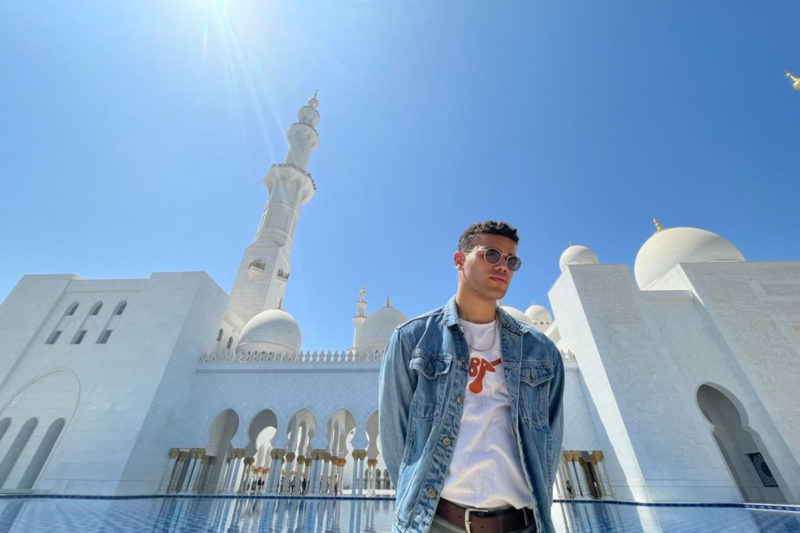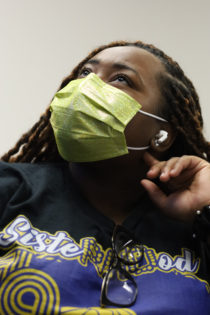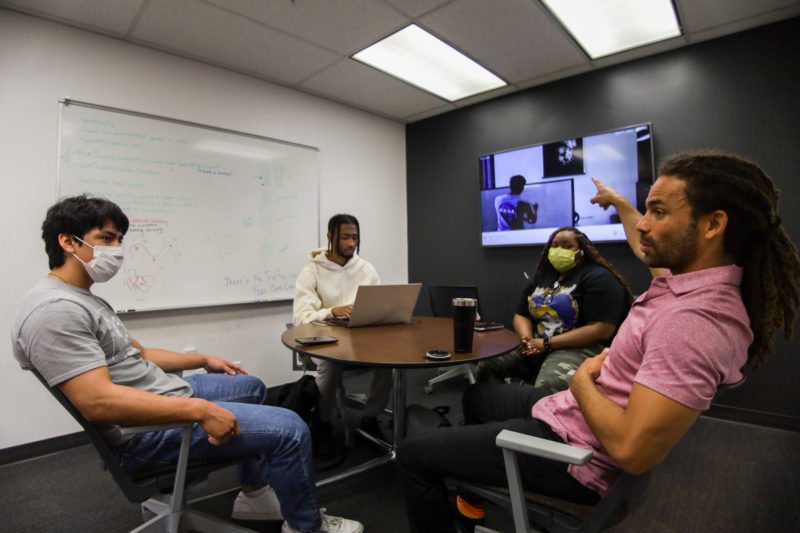How a UT-Austin Program is Helping Students of Color Study Abroad
By Cristela Jones
Reporting Texas

Justice Beverley, UT-Austin radio-television-film 2021 graduate, stands by the Sheikh Zayed Grand Mosque in Abu Dhabi, the United Arab Emirates in March 2022. Beverley has traveled to South Africa, China and the United Arab Emirates with the DDCE since his sophomore year at the university. Photo courtesy of Justice Beverley
University of Texas at Austin radio-television-film graduate Justice Beverley grew up taking vacations around the country with his family in an RV. He often filmed the trips. He loved it.
During UT freshman orientation in 2017, Beverley heard a presentation about the UT Division of Diversity and Community Engagement’s Global Leadership Program from Devin Walker, the director of the program. Beverley knew he wanted to study abroad with the program.
In 2018, Beverley traveled to South Africa with Walker. He has since gone on two other trips — to China in 2019 and the United Arab Emirates in 2022.
“They are really the reason I stayed at UT,” Beverley said. “I always knew that I wanted to film abroad if I could, but the opportunity seemed so difficult to grasp, and with them, they made me realize it was a lot more possible and gave me the confidence to do so.”
During the 2017-18 academic year, prior to the COVID-19 pandemic, about 11% of all U.S. college students studied abroad, according to reporting from Inside Higher Ed. Of those who studied abroad, Black students comprised 5.5%, Hispanic students 10.6% and Asian students 8.6%, while white students accounted for 70%, according to data from the Association of International Educators.
About 4.7% of Black UT-Austin students studied abroad in the 2018-19 school year, Heather Thompson, director of the university’s education abroad department, told Reporting Texas. Among all UT-Austin students, about 8.5% study abroad annually.

Students of the Global Leadership Cohort pose for a photograph at The Great Wall of China in Beijing in 2019. The program took 40 UT-Austin students on a month-long study abroad trip focused on social entrepreneurship. Photo courtesy of Devin Waker
The Global Leadership Program is helping to change the way students of color study abroad at UT by recruiting students of color and first-generation college students, offering study-abroad scholarships and building leadership programs for student success. Out of the 455 students who studied abroad with the Global Leadership Program from 2013 to 2019, 55% were Black and 26% were Hispanic. Almost 41% were first-generation college students.
The Global Leadership Program started in 2013, and more than 600 students have gone abroad since its first trip to Beijing, China. The program includes trips to South Africa, Costa Rica, Dubai and Abu Dhabi in the United Arab Emirates. After pausing for the pandemic, 120 students have enrolled in study-abroad trips in 2022.
Global Leadership trips range from two weeks to a month depending on the country and cost around $1,100, a price that Walker tries to keep as low as possible when arranging each trip’s hotel, transportation, excursions and activities.
“We have to make it affordable or else they won’t go,” Walker said.
Calvin Hayes, co-founder of HayesXchange, a podcast and website that promotes study abroad among underrepresented communities, told Reporting Texas that students of color often don’t study abroad because of three things – fear, finances and family.
“Students fear, especially at the university level, that if they spent a semester in South Africa, not only is that more money, but that might push back their graduation date,” Hayes said.
Experts say that participation in study abroad correlates with many benefits, including improved GPA post-study abroad, higher likelihood of graduating and the ability to better adapt to diverse work environments after graduation. Students who study abroad are also more likely to find employment 12 months after graduation, according to data from the University of California, Merced.
“They take students to places that are really going to stand out on the résumé, they are immediately the talking point,” Beverley said. “I think that’s really important for not only any student but the demographic of students that they’re taking — Black and brown students.”

Chasity Webb speaks with peers in one of the study rooms of the Perry-Castañeda Library at the University of Texas at Austin on Feb. 6, 2022. Jesus Munoz/Reporting Texas
Walker said the Global Leadership Program has such strong participation among students of color because it partners with other programs on campus such as UT’s Herman Sweatt Center for Black males and the Fearless Leader Institute for Black and Latina women at UT.
“We center our programs around the Black experience and what students of color may want,” Walker said. “It’s similar to an HBCU vibe in that you’re going with other Black students and Black professors, so what we’re doing here is rather unique.”
The Global Leadership Program is putting extra focus on Black men. In the 2019-20 school year, 67.4% of American students who studied abroad were women while 32.6% were men. These statistics have stayed fairly consistent for over a decade.
“There’s a challenge of getting men to study abroad so from the DEI (Diversity, Equity and Inclusion) lens, DDCE is building programs that speak to leadership. And we want to make sure that male students, especially Black male students are aware and are taking advantage of these opportunities,” Thompson said.
The Sweatt Center received a $750,000 donation early this year, which is helping more Black men study abroad with the Global Leadership program through the Sweatt International Scholars program.
Kendrick Henson, a sociology senior and board member for the Heman Sweatt Center, studied abroad with the division in Costa Rica after receiving a scholarship from the center in 2019. He said the scholarship made it feasible for him to take the trip and fully experience life as a Black student outside the U.S.
“In the United States as a Black male, I see police officers as people who, you know, may not like me or have the best intentions for me,” Henson said. “But when I was in the United Arab Emirates, the cops you couldn’t even tell they were cops; they were more like city peace officers since they didn’t have any guns.”

Devin Walker, Director of Global Leadership and Social Impact for the Division of Diversity and Community Engagement, right, discusses current events and social issues with students, Euler Deleon, Bryce Harris and Chasity Webb in one of the study rooms of the Perry-Castañeda Library at the University of Texas at Austin on Feb. 6, 2022. Jesus Munoz/Reporting Texas
Henson said studying abroad allows students of color to gain a new perspective on the world around them, immerse themselves in the culture of a new country and foster valuable connections with the people they travel with.
“There’s this hike we do in South Africa, where the students climb a mountain and that’s a very pivotal trip because of the feedback we get from students in that moment,” Walker said. “Many of them had never climbed a mountain before so that in itself is like overcoming this obstacle, but in addition, it’s also a metaphor for all these things you’ve experienced as a Black person, Black America and in history, so when they finally make it to the top of the mountain, it’s a moment where they sit with that and it becomes more.”